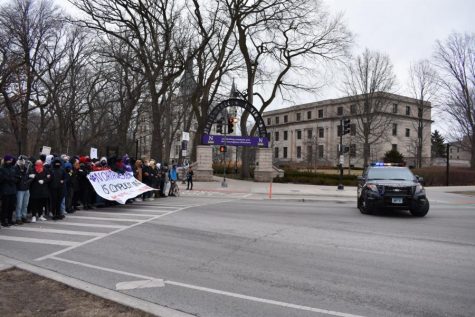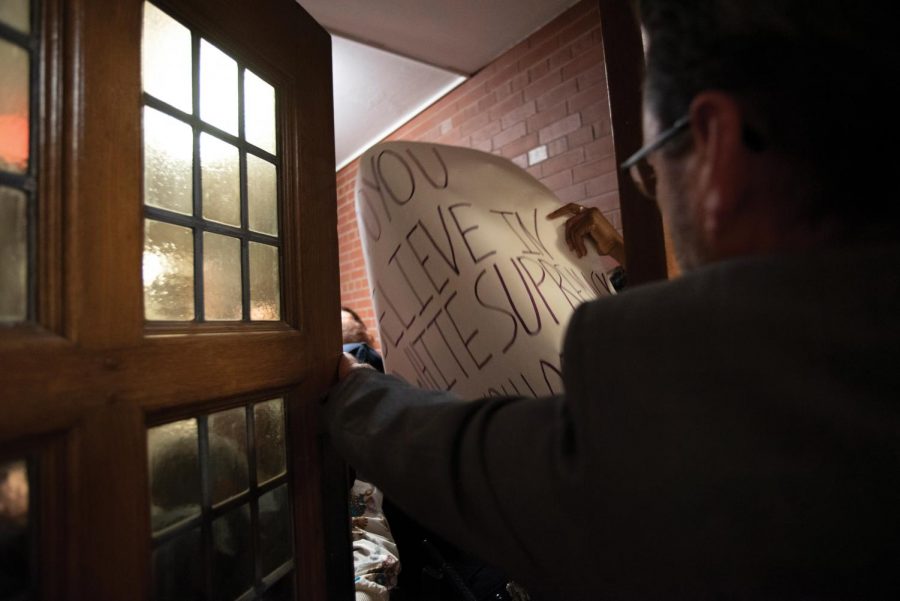Year in review: On campus
Daily file photo by Colin Boyle
Students attempt to enter Lutkin Hall, where former U.S. Attorney General Jeff Sessions was giving a speech on Nov. 6.
August 16, 2020
In a year full of the unexpected, Northwestern students raised their voices in the face of adversity, called for accountability and adapted to new styles of advocacy amid a global pandemic.
Jeff, justice and journalism
When Northwestern University College Republicans invited former U.S. Attorney General Jeff Sessions to the University as their 2019 fall speaker, students protested his presence on campus.
The protest grew in intensity, and students attempted to rush into the building and the lecture hall, where Sessions was speaking. They were met by University Police officers who forced students to leave. Student activist Elijah Beal (SESP ’20) said they were one of the first students to enter the building.
“We rushed in and I saw the police push people on the ground,” Beal said. “I myself was pushed out of the building.”
In a public response to the protest on Nov. 8, University President Morton Schapiro praised students’ drive to stand up for their beliefs but also defended police officers.
In December, UP issued citations to a small group of the student protestors for “disorderly conduct and interfering with the duties of a police officer.” These citations were largely contested, but were dropped in January.
Parallel to the events on campus, a national conversation broke out in the journalism community about protest coverage on college campuses and whether the pursuit of truth needs to come at the expense of people’s safety and privacy. Students criticized The Daily’s coverage, to which the editorial board responded with a letter and changes to some aspects of the published coverage. That letter was received by the professional journalism community with vitriol.
Demands for divestment

Over eight years of advocacy from Fossil Free Northwestern culminated in demands that the Board of Trustees divest from the top 100 coal, oil and gas companies.
Talks between the board and the student group began in the fall of 2014. In June 2019 the group’s official proposal for the University to divest from fossil fuels was submitted to the board.
“Despite our frustration and disillusionment with this apathetic and complacent University, we are gathering here today to build solidarity and a sustainable community,” said Keala Uchoa, Fossil Free NU president and Weinberg junior, at a teach-in on Feb. 13.
The board ultimately rejected Fossil Free’s proposal on Feb. 20. Students then hardened their resolve. On March 6, about 60 students blocked Sheridan Road for over an hour. No one was arrested or charged.
Coronavirus concerns
On April 6, the University announced that Spring Quarter would be entirely remote. Not only did more students continue their research and studies into the summer, but many groups found ways to adapt their advocacy to a virtual space.
Before and after the transfer to a remote quarter, Coalition NU, a group of “underrepresented and underserved scholars” from The Graduate School, advocated for marginalized groups in a letter that circulated in early March.
Since the pandemic presented unique challenges to TGS students, they doubled down on their demands because “these needs have been made even more apparent by the COVID-19 pandemic,” according to a tweet by Coalition NU.
In April, students at Northwestern University Graduate Workers organized a tweet storm with the hashtag #universal1yr to support an additional year of funding. Workers also held a virtual sit-in on May 3 and continued to use the hashtag.
Another Northwestern group advocating for more funding is Students Organizing for Labor Rights. They began raising money on March 13 — two days after the University announced remote learning for Spring Quarter.
On March 30, the University announced a plan for compensation, but NU dining and hospitality workers said they didn’t receive the resources. As furloughs turned to layoffs in July, students in SOLR continued to raise money and advocate that the workers receive pay and health coverage amid the pandemic.
Summer Session continues to unfold and many students remain vigilant in their advocacy. This past school year was defined by groups like Fossil Free and SOLR, and continues to be revolutionized by groups like NU Community Not Cops.
Beal, who spent much of their time volunteering and advocating in the past school year, said the Sessions protest was a point of inspiration.
“It influenced me to get more involved in that kind of thing,” Beal said. “Since then I’ve been a lot more involved in SOLR, Fossil Free and more recently the black action group that’s doing organizing around Community Not Cops.”
For Beal, the question was not if they should move forward with social justice action, but how soon they could get started.
Email: [email protected]
Twitter: @emmayarger


